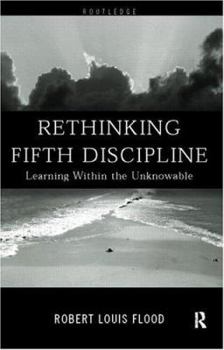Rethinking the Fifth Discipline: Learning Within the Unknowable
Select Format
Select Condition 
Book Overview
'Fifth Discipline' is one of the very few approaches to management that has attained position on the International Hall of Fame. Professor Flood's book explains and critiques the ideas in straight forward terms. This book makes significant and fundamental improvements to the core discipline - systemic thinking. It establishes crucial developments in systemic thinking in the context of the learning organisation, including creativity and organisational...
Format:Paperback
Language:English
ISBN:0415185300
ISBN13:9780415185301
Release Date:July 1999
Publisher:Routledge
Length:232 Pages
Weight:0.85 lbs.
Dimensions:0.7" x 6.1" x 9.2"
Customer Reviews
3 ratings
A very readable and practical book on organisational learning
Published by Thriftbooks.com User , 18 years ago
Being a fan of Senge's work I was sceptical at first, but Bob Flood build on Senge's work and puts into a larger context of thinking holistically and futuristically. He adds complexity into the mix in that we must prepare for the unexpected and yet unknown situations using his diagrammatical perspective on scenario planning. I also enjoyed his pages on Satori, his bookshelf metaphor on Process, Structure, Meaning and Fairness (Knowledge-power as he coins it). The bottom line of the book as he puts it: * we will not struggle to manage over things, we will manage within the unmanageable; * we will not battle to organise the totality, we will organise within the unorganisable; and * we will not simply know things, but we will know of the unknowable. Flood co-authored `Creative Problem Solving' with Jackson, but I recommend getting this book instead as well as Jackson's later book `Systems Thinking: Creative Holism for Managers'.
A challenging, thought provoking book!
Published by Thriftbooks.com User , 23 years ago
This book will provide you value if you're looking for information and analysis of system thinking, and wish to better understand Dr. Senge's seminal book "The Fifth Disciple". However, just as an historical introspective over the last 60 years, it's worth the price of the book alone. Mr. Flood examines the Fifth Discipline under the careful eye of an academic researcher, bringing into play some of great system thinkers of the past to make his points regarding Senge's five disciplines. As these great thinkers are brought forth, windows of opportunities for new knowledge open up, as do gaps of unspoken positions in Senge's work.I enjoyed this book very much, probably because it was so unique and carefully laid out. After all, how often to you see a book which is basically a term paper of another book, written by the best professor at the school?I came away with not only a better understading and appreciation of the Fifth Discipline, but also with a clearer understanding of the history of system thinkers, and how they've each brought us a unique perspective to consider.
Original, profound yet easily understood and operationalised
Published by Thriftbooks.com User , 25 years ago
The content of Professor Flood's latest book is original and profound, but easily understood and operationalised, therefore this book can be considered a "must have" by academics, students, interventionists, consultants and managers alike. It successfully elucidates how the concepts of Systems Theory, Complexity Theory, Organisational Learning and Organisational Intervention are inextricably intertwined.There is a significant degree of emergent synergy that arises from the complementarist use of the Senge's approach (as described within the "Fifth Discipline") when used in conjunction with Flood's guiding> frameworks for organisational intervention and improvement. In isolation, Senge provided his readers with guidance on organisational learning - but provided no pragmatic steps to guide organisational analysis and the actual selection and use of improvement strategies. Conversely, Flood's previous writings provided a guiding framework for facilitating organisational improvement but lacked the organisational learning approaches that are simultaneously required if the need for organisational improvement (i.e. change) is to be recognised, validated, operationalised, reflexively critiqued and assimilated as part of a revised organisational paradigm. Empirical studies have clearly demonstrated that without the tools to facilitate organisational learning, it is quite likely that the need and desire to implement change strategies will be attenuated by organisational defence mechanisms. (See the work of Argyris in this regard). Therefore, the augmentation of organisational improvement frameworks with organisational learning offers interventionists an enhanced degree of success. <p>Thus, by effectively combining his interventional strategies with the Senge's organisational learning strategies, Flood has successfully created a pragmatic approach that is more potent than the sum of its constituent parts. The emergent synergy is not by any means a coincidental by-product of the amalgam. Flood clearly explains how the inescapable and tangible manifestations of Complexity Theory require us to "learn our way into an unknowable future". Flood's book also effectively prepares the reader for the adaptations that will be necessary in contending with a dynamically changing organisational landscape.<p>This book is highly recommended to all those with an interest in organisational learning, change management, systems theory and complexity theory.






